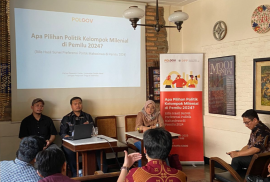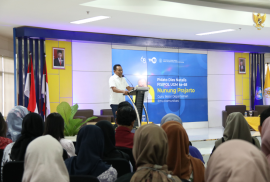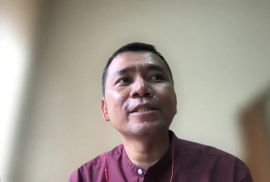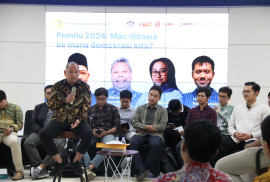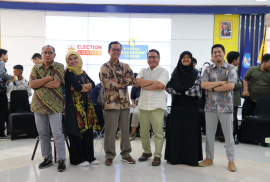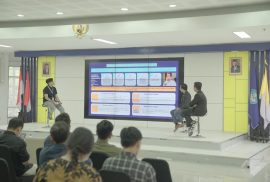Yogyakarta, September 27th 2023─In this digital era, a wide audience has adopted social media (including X) as the main channel for sharing political views, election information, and debates about candidates who will compete in the General Election (Pemilu) in 2024. Center for Digital Society (CfDS) FISIPOL UGM participated in the discussion ahead of this democratic party through a press conference with the theme “Bacapres Trends on Platform X: Opinion War, Cyber Troop, to Jokowi’s Cawe-cawe” held at Digital Intelligence Lab (DIL) Faculty of Social and Political Sciences UGM on Wednesday (27/09). This event presented Syaifa Tania as Executive Secretary of CfDS UGM and Agung Tri Nugraha as Research Manager of CfDS UGM to respond to the latest trends that affect online conversations and support for political figures in Indonesia.
Jakarta, September 26th 2023─The electoral year is fast approaching. The youth group (millennials) is a strategic target seeing its enormous potential to reach 56.45% or around 113 million voters. One of the young voter groups is university students. Students’ opinions and preferences are central because their level of literacy and attention to public issues and political dynamics can have implications for the political attitudes of other voter groups. On this basis, the “PolGov” Research Center, Department of Politics and Government, FISIPOL UGM conducted a survey as an effort to map these political opinions and preferences. The release of the Survey Results of Political Opinions and Preferences of Indonesian Students in the 2024 Election entitled “What are the Political Choices of the Millennial Group in the 2024 Election?” was delivered on Tuesday (26/9) at Bakoel Koffie Cikini, Jakarta. Attended by three speakers, namely Arya Budi (Lecturer at the Department of Politics and Government), Faiz Kasyfilham (POLGOV UGM Researcher), and Dr. Nihayatul Wafiroh (Member of the House of Representatives).
Yogyakarta, September 22nd 2023─Having alumni spread in various fields, Faculty of Social and Political Sciences UGM held a discussion forum entitled “Post-Grad Transition: Preparation for the World of Work” on Friday (22/9). This discussion brought together alumni of the Faculty of Social and Political Sciences class of 1988 (KAFGAMA 88) who have been in the world of work, both in the government and private sectors. Some of the alumni who attended included Prof. Drs. Anwar Sanusi, MPA, Ph.D., Anung Anindita, Easy Masita, Lestarijati Dyah S, S. Kom, FX. Bambang Kusuma Prihandono, S.Sos., MA, and Nandang Haris, SIP, M.P.P.
Yogyakarta, September 19th 2023─As the 2024 presidential and presidential candidate elections approach, the public is abuzz with discussions about the elections. Currently, there are three political figures predicted as presidential candidates, namely Anies Baswedan, Ganjar Pranowo, and Prabowo Subianto. Welcoming the recent discussions about the three figures, Universitas Gadjah Mada collaborated with Narasi and supported by the Faculty of Social and Political Sciences UGM to present the three vice presidents through the Mata Najwa on Stage event: Bacapres Bicara Gagasan. The event was hosted by Mata Najwa’s own host, Najwa Shihab, on Tuesday (19/9) at Grha Sabha Pramana UGM and also became a series of the 68th Anniversary of the Faculty of Social and Political Sciences UGM.
Yogyakarta, September 19th 2023─Welcoming its 68th Anniversary, the Faculty of Social and Political Sciences of Universitas Gadjah Mada organized a series of events beginning with the Opening Speech and Seminar entitled “Smart Voters for Future Indonesian Leaders”. The event was held offline on Tuesday (19/9) at the Auditorium Mandiri Fisipol UGM. Present as speakers in the talk show session were Rizal Mallarangeng, Founder of Freedom Institute; Ismail Fahmi, Founder of Drone Emprit & Media Kernels Indonesia; and Hermin Indah Wahyuni, Professor of Department of Communication Science (DIKOM) Universitas Gadjah Mada.
Yogyakarta, September 16th 2023─The achievement of student learning outcomes will be largely determined by the learning methods used. Unlike the primary and secondary school levels, learning in higher education has more complex elements. Moreover, the lecture method emphasizes focused and in-depth learning in a particular field. As a teacher, obstacles and challenges are often encountered in providing material with fun and enjoyable methods.
“We as educators have a clear legal basis, where we have various learning outcome standards. These outcomes are then translated into learning process planning, implementation, and assessment. And if you check the Permendikbudristek, it turns out that we are told to do innovative learning,” said Dr. Grendi Hendrastomo, S.Sos., M.M., M.A. in “Webinar Continuing Professional Development (CPD) Series #1: Innovative Learning Methods” on Friday (15/9).
Yogyakarta, September 8th 2023─Center for Digital Society (CfDS) of FISIPOL UGM together with Intudo held a discussion forum Digitalk #58 X BUMI (Berkarya Untuk Masyarakat Indonesia): “Understanding the Opportunities and Dynamics of the Start-up Industry” at the Auditorium Mandiri, on the 4th floor of the Faculty of Social and Political Sciences of UGM. This forum is intended to be a forum for start-up industry players, experts, students, and the general public to introduce various dynamics in the Indonesian start-up ecosystem today.
Yogyakarta, August 31st 2023─Ahead of the elections, the presence of the General Election Supervisory Agency (Bawaslu) is very significant because it determines the quality of Indonesian democracy. For Bawaslu, the complexity of the 2024 Election will not be an obstacle. “This is a maturing process in democracy. That is the importance of the presence of election organizers,” said Totok Hariyanto on Thursday (31/8). The Bawaslu member attended the FISIPOL Leadership Forum (FLF) to discuss the opportunities and challenges of the 2024 elections, including the “Campaign on Campus”.
Yogyakarta, 30th August 2023─General elections are an essential feature of every democratic country, including Indonesia. The 2024 elections will be a complex political event that will determine the quality of Indonesia’s democracy. The complexity of the 2024 elections is illustrated by the five voting rights that voters will have simultaneously, ranging from the Presidential and Vice Presidential Elections (Pilpres) to the Legislative Elections (Pileg) to elect members of the DPR RI, Provincial DPRD, Regency/City DPRD, and DPD. Responding to the complexity of the 2024 Election, FISIPOL UGM once again organized the FISIPOL Leadership Forum (FLF) by inviting the Chairman of KPU Yogyakarta, Hamdan Kurniawan on Wednesday (30/8).
Yogyakarta, August 29th 2023─Successfully opening the Digital Intelligence Course (Mata Kuliah Kecerdasan Digital or MKKD) program since 2020, now the Center for Digital Society (CfDS) of the Faculty of Social and Political Sciences, Universitas Gadjah Mada, has opened three new classes, namely the Basic Digital Intelligence Class, Digital Transformation and Elections, and Unveiling Decentralized and Digital Economy which are open to the general public for free. Not alone, CfDS collaborates with various institutions and organizations, such as Election Corner, Algohub, Algorand Foundation, and IBF Net to organize the classes offered. In addition, the program also collaborates with the Indonesian Ministry of Communication and Information, Siberkreasi, and the Indonesian Ministry of Education and Culture.


